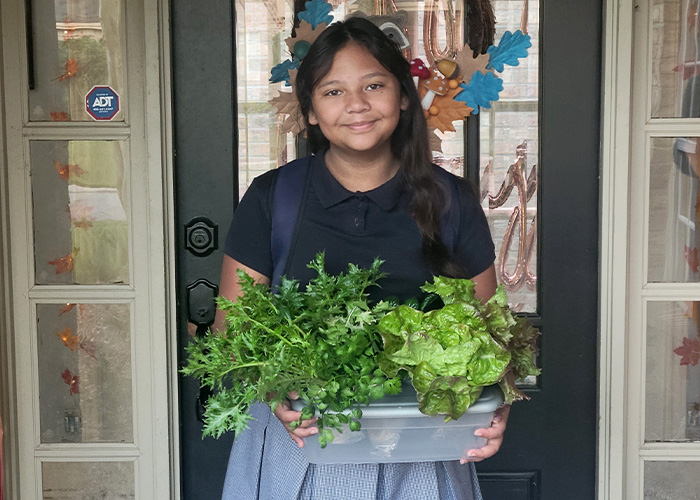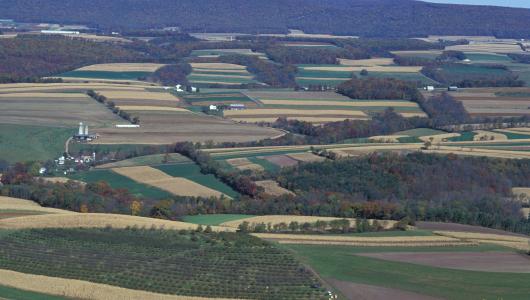This Friday meet Trinity Waguespack, an 11-year-old urban farmer in Lafayette, Louisiana. When she’s not tackling her schoolwork, Trinity is busy growing lettuce in her three hydroponic garden towers. Through precision agriculture and artificial intelligence technology, the towers notify her when the lettuce needs water, even when she’s at swim practice.

“I like hydroponics because it lets me stay away from the outdoor bugs and hot weather,” said Trinity. “It’s also cool to grow things in water.”
Getting Started
What started as a sixth-grade project with one seed turned into several household grown plants and a newfound interest in agriculture, giving Trinity the opportunity to grow lettuce for her family and friends. Despite not having farm experience, Trinity decided to try something new last summer and discovered her passion for hydroponics, a technique that uses a water-based nutrient solution rather than soil to grow plants.
Hydroponics is a form of innovative production, a diverse and dynamic area of agriculture that includes indoor controlled environment agriculture, rooftop farms, outdoor vertical production, green walls, high-tech vertical farms, greenhouses, and aeroponic, or aquaponic farms. Among their many benefits, these operations are creating economic opportunities for the next generation of agricultural producers, like Trinity.

To get started, Trinity worked with local USDA Farm Service Agency (FSA) staff to obtain youth loans to purchase her three 30-grow-capacity garden towers and to cover operating expenses.
FSA youth loans provide opportunities for young entrepreneurs to acquire experience and education in agriculture-related skills. These loans provide up to $5,000 for people 10 to 20 years old. Youth loans can be used to start and operate income-producing projects of modest size and are available to members of 4-H clubs, FFA, a Tribal youth group, or similar agricultural youth organizations.
Growing a Customer Base
Trinity sells her lettuce to friends, family members, and locally by word of mouth. Her father, Joshua Waguespack, said he wanted his daughter to have a project of her own that required some discipline and one they could work on together.

“I have watched her grow as a responsible young farmer,” Joshua said. “She is taking control of her production, keeping records of her expenses and income, making decisions, making payments on time, and communicating with local FSA loan officials.”
Trinity credits her parents for guiding her through the process of building a business. Aside from the business skills she has acquired, Trinity said she has learned a lot about pivoting and listening to customer demand. As demand grows, Trinity plans to expand her operation to include monthly customer order options, and FSA is standing by to help.
More Information
Visit local farms, ranches, forests, and resource areas through our Fridays on the Farm stories. Meet farmers, producers and landowners who are working to improve their operations with USDA programs.
Are you gardening or farming in an urban environment? Are you looking to integrate innovative production practices in your operation? Learn about USDA resources that can help you start and grow your operation.
USDA offers a variety of risk management, disaster assistance, loan, and conservation programs to help producers weather ups and downs in the market and recover from natural disasters as well as invest in improvements to their operations. Learn about additional programs.
For more information about USDA programs and services, contact your local USDA service center.
Shantelle Turner is a Management and Program Analyst for FSA’s Farm Loan Programs. For more information about this story, reach out to Anthony Reed, state public affairs and outreach coordinator for FSA in Louisiana.


